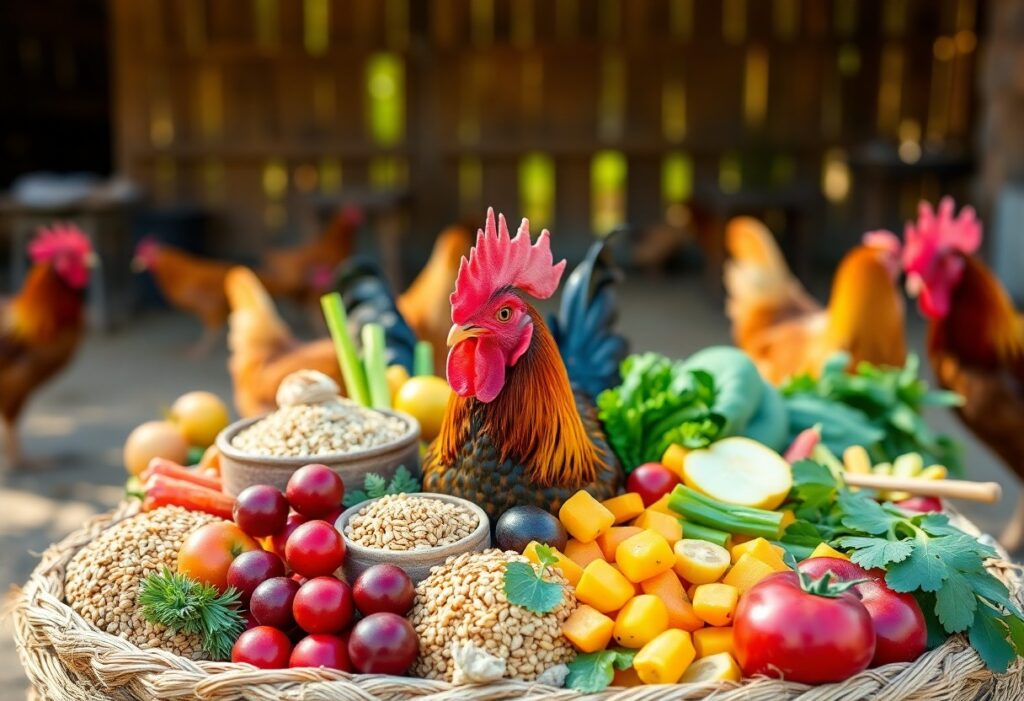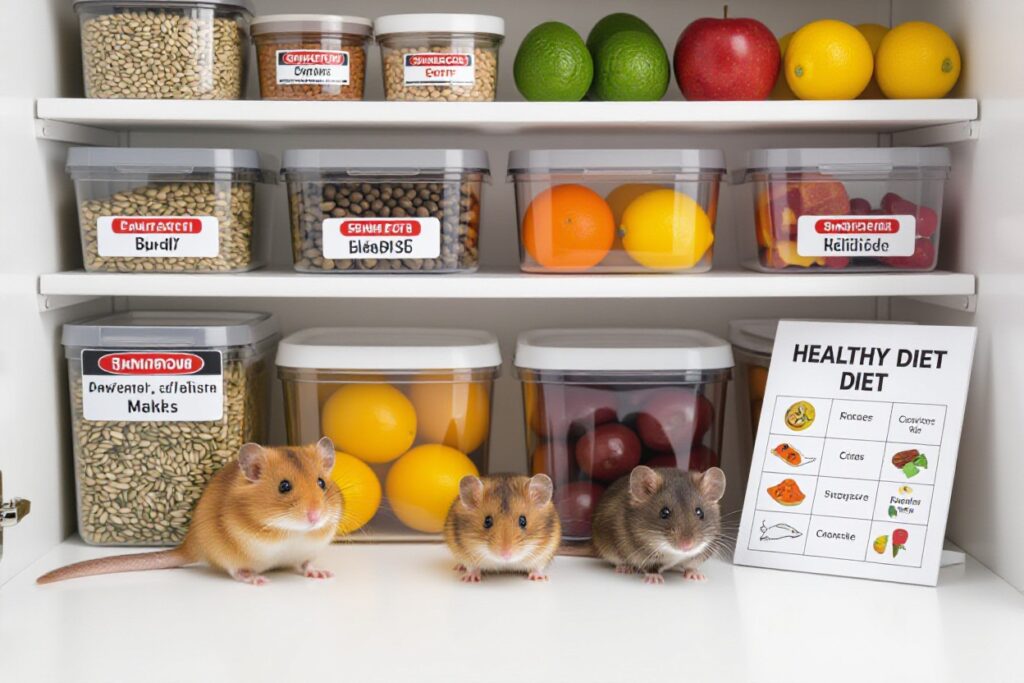Many rooster owners may overlook the importance of a balanced diet in ensuring their birds live a long and healthy life. To promote longevity and vitality, you need to provide your rooster with a mix of high-quality grains, proteins, vitamins, and minerals. By understanding the nutritional needs of your rooster and formulating meals that cater to these requirements, you can significantly extend their lifespan and enhance their overall well-being. In this guide, you’ll learn practical tips on creating a diet that keeps your rooster healthy and thriving.
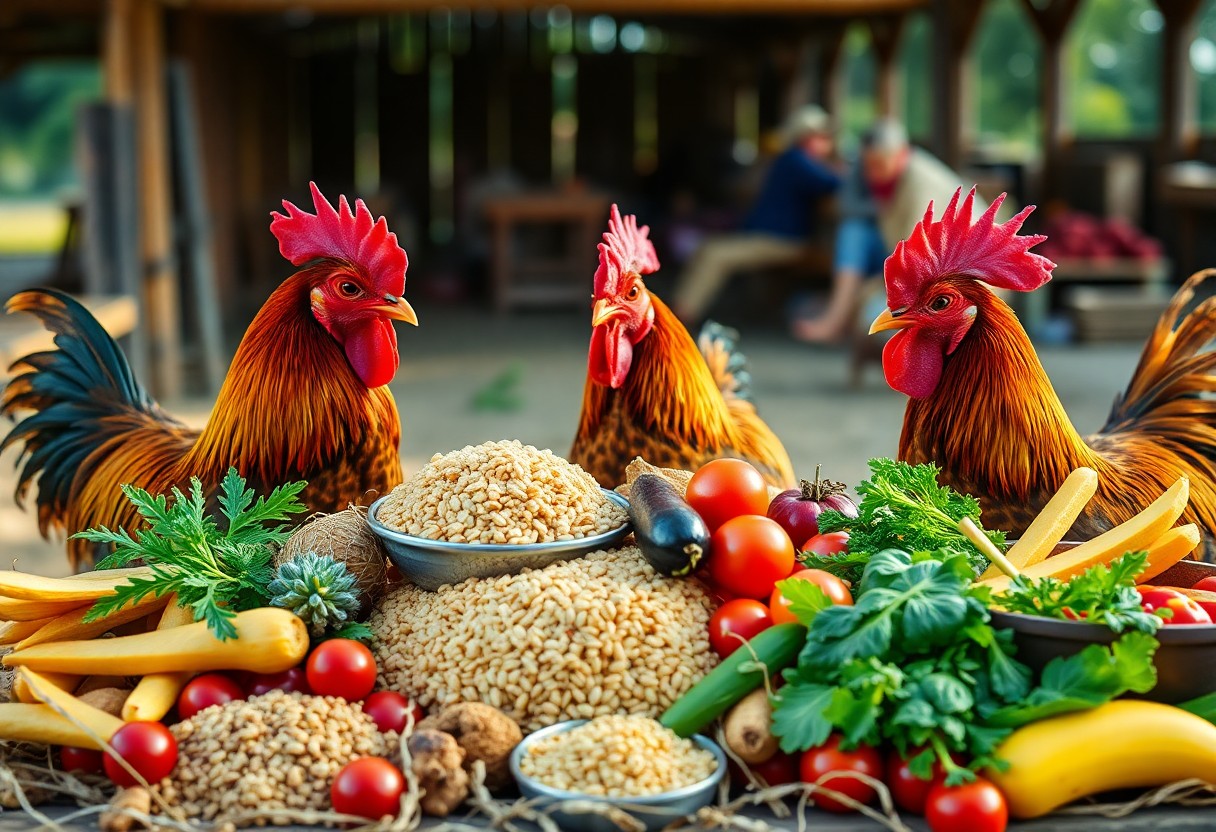
Key Takeaways:
- Incorporate a variety of grains, vegetables, and protein sources to ensure a well-rounded nutrient intake that supports overall health.
- Provide access to clean water and consider adding supplements like vitamins and minerals to enhance diet quality, especially during molting or breeding seasons.
- Monitor portion sizes and adjust feed types based on the age and activity levels of your roosters to prevent obesity and health issues.
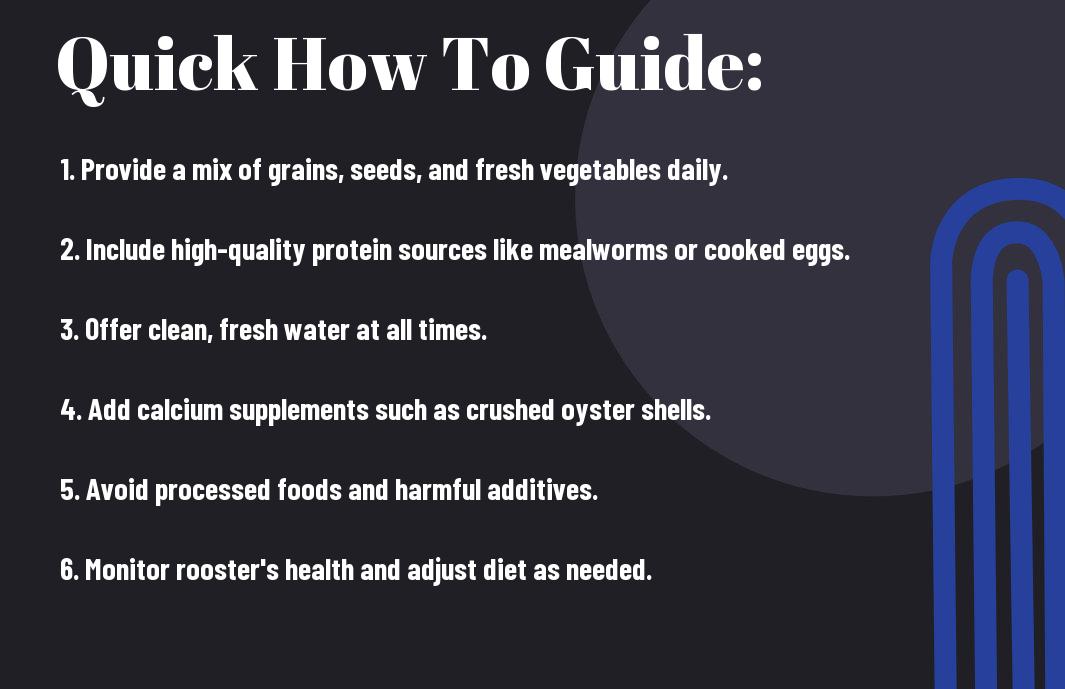
Understanding Rooster Nutritional Needs
For your roosters to thrive and enjoy a long life, it’s imperative to grasp their unique nutritional requirements. Proper nutrition not only supports everyday health but also plays a fundamental role in boosting their immune system and fostering overall vitality. By offering a well-balanced diet rich in necessary nutrients, you can significantly enhance their quality of life and longevity.
Key Nutrients for Longevity
Longevity in roosters is significantly influenced by the right balance of nutrients. Ensure their diet includes high-quality protein, vitamins such as A and E, and imperative minerals like calcium and phosphorus. These nutrients are vital for maintaining strong bones, promoting robust feather growth, and supporting overall metabolic functions. Incorporating a variety of foods can help provide these important nutrients, contributing to your rooster’s long, healthy life.
Factors Affecting Rooster Health
Factors that impact your rooster’s health go beyond just diet. Several extrinsic and intrinsic variables can influence their well-being. Key factors include:
- Genetics
- Stress levels
- Environmental conditions
- Healthcare practices
Recognizing these influences allows you to create a more supportive environment for your roosters, ensuring they live longer, healthier lives.
Rooster health is influenced by various aspects beyond nutrition. You must pay attention to your roosters’ living conditions, as factors like space and environmental hygiene (such as adequate ventilation and clean bedding) can drastically affect their well-being. Additionally, stressors like overcrowding or aggression from other birds may lead to health issues. Regular veterinary check-ups are also vital in preventing and addressing potential health concerns. Recognizing these influences helps create a nurturing environment for your flock.
How to Create a Balanced Diet
While designing a balanced diet for your rooster, it’s necessary to focus on providing a variety of nutrients that support their overall health and longevity. Ensure the feed you choose contains a mix of proteins, carbohydrates, vitamins, and minerals. This approach helps maintain your rooster’s energy levels and enhances its immune system, contributing to a longer, healthier life.
Selecting Quality Feed
Quality feed is the foundation of a balanced diet for your rooster. Look for options that are specifically formulated for poultry and contain high-quality ingredients. Avoid feeds with excessive fillers and artificial additives, as these can compromise your rooster’s health and well-being.
Incorporating Fresh Foods
Balanced fresh foods can significantly enhance your rooster’s diet and provide necessary nutrients. You should introduce a variety of fresh fruits, vegetables, and grains to create a more enjoyable and nutritious meal experience. Aim for options like leafy greens, berries, and grains to introduce natural vitamins and minerals.
Plus, incorporating fresh foods not only enhances the nutritional profile of your rooster’s diet but also offers mental stimulation and enrichment. Be mindful to avoid toxic foods such as onions and avocados. Instead, focus on safe options like carrots and pumpkins to promote a healthy digestive system. Regularly providing fresh foods encourages your rooster to explore different flavors while supporting their overall vitality.
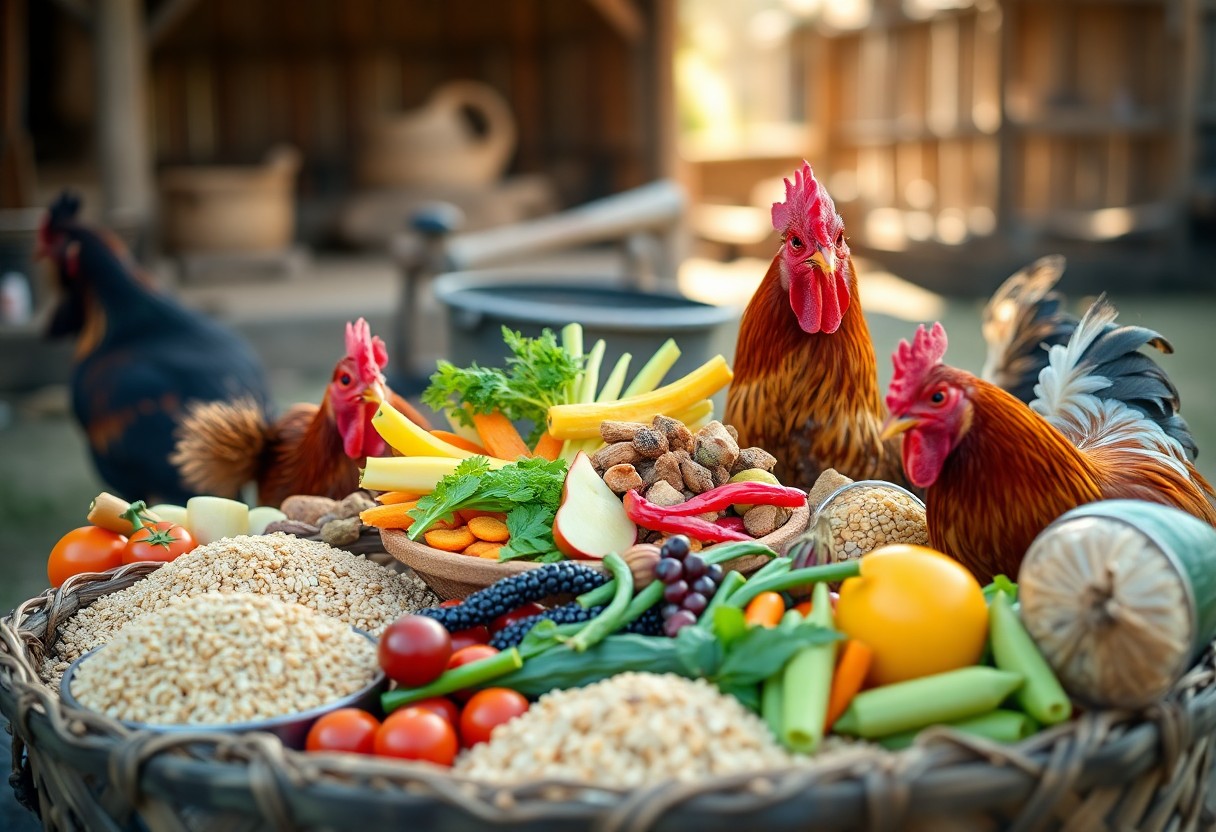
Tips for Maintaining a Balanced Diet
Keep your rooster healthy by ensuring a balanced diet rich in nutrients. Consider these tips:
- Provide a mix of grains, fruits, and vegetables
- Incorporate proteins such as insects or mealworms
- Ensure fresh, clean water is always available
- Limit treats to avoid overfeeding
Thou shall create a diet that fosters longevity and vitality.
Portion Control
To optimize your rooster’s health, practice portion control by measuring their feed daily. This ensures they receive the right amount of nutrients without overindulging, which can lead to obesity and other health issues. Tailor portion sizes based on your rooster’s age, size, and activity level to maintain an ideal weight.
Regular Dietary Adjustments
Tips for keeping your rooster’s diet effective include making regular dietary adjustments. As your rooster ages or undergoes changes in activity, their nutritional needs will shift. Monitor their health and weight, and adjust their portions and ingredients accordingly to ensure they’re receiving the right balance of nutrients. This can include increasing protein for younger birds or more fiber for older ones.
Plus, being attentive to even subtle changes in your rooster’s behavior or appearance can indicate the need for a dietary shift. If your rooster seems less energetic, it might be time to increase their caloric intake, while weight gain might require you to cut back on treats. Stay vigilant, as an imbalanced diet can lead to health problems, such as obesity or nutritional deficiencies, adversely affecting their overall longevity and quality of life.
The Role of Supplements
Many rooster owners find that incorporating supplements into their pets’ diets can significantly enhance their overall health and longevity. Supplements can address specific dietary shortcomings and support well-being, particularly during critical growth phases or times of stress. These additional nutrients can help in maintaining immune function, promoting feather health, and aiding in overall vitality. Assume that a balanced supplement strategy complements your rooster’s diet, thus ensuring they thrive.
Types of Supplements
There are various types of supplements available for roosters, each serving a unique purpose that aligns with their health needs:
- Vitamins
- Minerals
- Probiotics
- Amino Acids
- Herbal Remedies
| Supplement Type | Benefits |
|---|---|
| Vitamins | Boosts overall health |
| Minerals | Supports bone development |
| Probiotics | Aids digestion |
| Amino Acids | Enhances muscle growth |
| Herbal Remedies | Promotes natural healing |
When to Use Supplements
When your rooster faces stressors such as extreme weather changes or illness, it may be beneficial to use supplements to support their health. Adjusting your rooster’s diet during growth phases or periods of reproductive activity can also be advantageous. This timing enables you to provide the necessary nutrients that may not be present in their regular feed. A well-timed supplement regimen can help stave off deficiencies and enhance your rooster’s longevity, vitality, and overall health.
Hydration and Its Importance
After ensuring your rooster enjoys a balanced diet, don’t overlook the importance of proper hydration. Water is vital for all bodily functions, including digestion and temperature regulation. When your rooster is well-hydrated, it enhances overall health, boosting energy and supporting longevity. Dehydration can lead to serious health issues, making it imperative to provide fresh and accessible drinking water daily.
Water Quality
Quality water is imperative for your roosters’ health. Ensure that their drinking water is free from contaminants and has a moderate pH level. Regularly cleanliness the water containers to prevent the growth of harmful bacteria. Consider using filtered or fresh rainwater to provide the best quality source for your flock.
Hydration Tips
Assuming you want to keep your rooster well-hydrated, consider implementing the following hydration tips:
- Provide fresh water daily to avoid stagnation.
- Ensure water containers are clean and free of debris.
- Monitor your rooster’s water intake to identify any health issues.
- In hot weather, offer cool water to help regulate body temperature.
Thou should keep an eye on their water consumption to maintain optimal health.
To further support hydration, consider these additional strategies:
- Offer hydrating treats like fruits and veggies.
- Check for signs of dehydration, such as dry skin or lethargy.
- Provide a consistent water source throughout the day.
- Use a waterer with easy access to promote regular drinking.
Thou will greatly enhance your roosters’ quality of life with these simple measures.
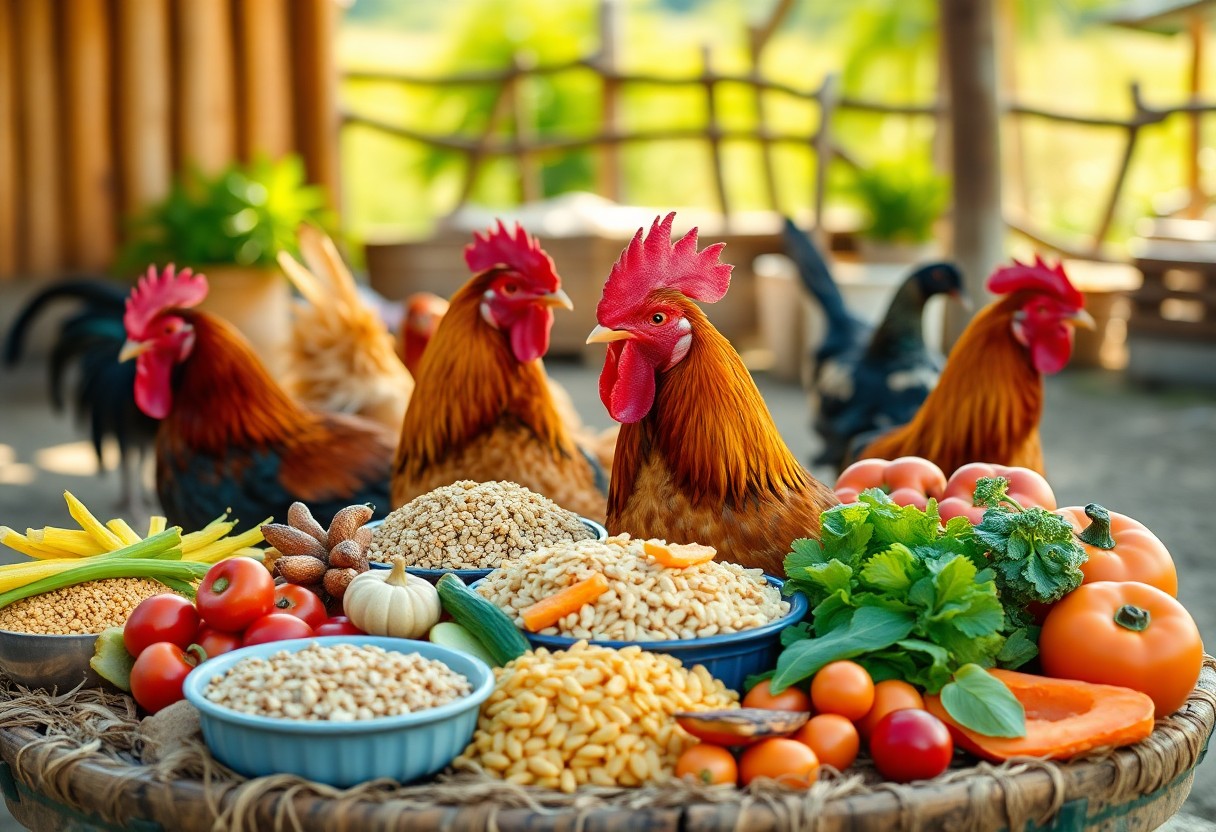
Common Dietary Mistakes to Avoid
All roosters require a carefully planned diet to thrive, but there are several common dietary pitfalls you should avoid. One such mistake is overfeeding or underfeeding, which can lead to serious health issues. Additionally, failing to provide a diverse selection of foods can leave your rooster lacking vital nutrients needed for longevity. By steering clear of these errors, you can help ensure your rooster leads a healthy, vigorous life.
Overfeeding vs. Underfeeding
Overfeeding can lead to obesity, causing various health problems in your rooster, including joint issues and heart disease. Conversely, underfeeding may result in malnutrition, making your rooster weak and susceptible to illness. Both extremes can significantly impact your rooster’s overall wellbeing, so aim for a balanced approach that meets their energy and nutritional requirements.
Ignoring Nutritional Variety
Mistakes can happen when you stick to a monotonous diet for your rooster. Providing a limited selection of foods can lead to deficiencies in imperative vitamins and minerals that are vital for your rooster’s health. Nutritional variety is important for maintaining optimal immunity and vitality. Incorporating a mix of grains, seeds, vegetables, and protein sources not only keeps your rooster interested in their meals but also ensures they receive a well-rounded diet. So, enhance their meals with different foods to promote better health and longevity.
Summing up
From above, you can see that creating a balanced diet for your rooster is imperative for promoting longevity and overall health. By including a variety of grains, proteins, vitamins, and minerals, you ensure that your rooster receives the nutrients it needs to thrive. Regularly assess your rooster’s nutritional requirements based on its age and activity level, while also providing clean, fresh water. With attentive care in dietary planning, you can help your rooster lead a long and vibrant life.
Q: What are the important components of a balanced diet for roosters?
A: A balanced diet for roosters includes a combination of protein, carbohydrates, vitamins, and minerals. Protein sources can include grains, seeds, legumes, and insects. Carbohydrates should primarily come from grains like corn, wheat, or barley. It’s also important to incorporate fresh fruits and vegetables for their vitamins and minerals, which can help improve overall health and longevity. Additionally, providing access to grit and oyster shell can aid in digestion and support calcium needs for strong bones.
Q: How often should roosters be fed to ensure a balanced diet?
A: Roosters should be fed twice a day to maintain energy levels and support their nutritional needs. It’s advisable to provide a consistent feeding schedule, with a mix of commercial poultry feed and supplementary treats like fruits, vegetables, and protein sources. This helps to ensure they receive a well-rounded diet while preventing overfeeding, which can lead to obesity and health issues. Always make sure to adjust portion sizes based on individual roosters’ needs, age, and activity levels.
Q: Are there specific foods that should be avoided in a rooster’s diet?
A: Yes, certain foods should be avoided to maintain the health and longevity of roosters. Foods that are toxic or harmful include chocolate, avocado, caffeine, and any moldy or spoiled items. Additionally, highly processed human foods and those high in fat or sugar should be limited as they can lead to health issues such as obesity or heart problems. Providing a varied and nutritious diet, while avoiding harmful substances, is key to promoting the well-being of roosters.
